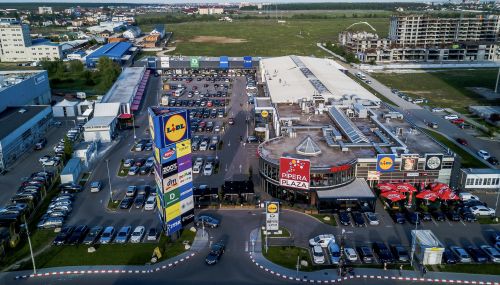Upper class but unlanded
Hotels
The healthy long-term forecasts for Poland have been encouraging investors to look for new locations for hotels. Plots for hotels in Warsaw and Kraków are currently the most sought after. In Warsaw there are shortages in every respect, despite the fact that according to JLL the Masovian province is the region that clearly dominates the market in terms of the number of hotel rooms in Poland. This is not enough, though. There is certainly a shortage of good four-star hotels and the most exclusive classes, believes Colliers International. Things, however, should get better. The dynamic development of the hotel market that took place in 2015 translated into a growth of interest in land designated for such projects. “In our opinion the trend will continue in 2016,” says Daniel Puchalski, the director of the investment land department at JLL. So what should a plot for a hotel be like? The best ones are cheap, located in the city centre or near an airport and they are ready for the construction process. The only problem is that such plots are hard to find. A plot for a city hotel needs to be sufficient for a building with a total area of 4,500 sqm to 10,000 sqm – and up to 20,000 sqm in some of the largest cities. “There should be the option of building a ground-level car park outside the city centre, according to Hotel Professionals. “The inability to adequately fit in a hotel building is a common problem in terms of finding a good location. A hotel cannot be shaped freely due to conditions such as the access to daylight in the rooms as well as the relatively low depth of the rooms compared to offices. Consequently it is not always possible to use the available development area in the optimal way, which has a negative impact on the plot price to total cost ratio. One solution could be combining the hotel function with office and retail areas for city centre projects,” explains Jacek Tokarski, a partner and senior investment analyst at Hotel Professionals.
We want more!
“I regard Poland as a country that is poor in terms of hotels. For example, there are no luxury hotels, such as Elite by Marriott,” points out Emil Domeracki, an expert in the land investment consultancy department at Colliers International. The first luxury hotel in the country is to be built on Krakowskie Przedmieście in 2018 – replacing the former Europejski Hotel, which is currently being extensively renovated. It will re-open under the Raffles Hotels & Resorts brand. For some time there has also been gossip, unconfirmed by the chain, about Wyndham’s willingness to enter Poland. Such luxury hotels could be built in the same area as the future Raffles. So why are they are not being developed in this part of the city? First of all, because of the cost of the land. “Admittedly, there are plots in the city centre, but there are also the investors’ economic calculations. The office market and the hotel market have different rates of return on investment. You need to have a long-term approach here. Hotels are often a hobby for investors. It is difficult to reconcile a good location and a good price. There might only be one or two chains that can buy a plot for a hotel project, while others look for an investor that already has the plot. Others want to operate on a franchise basis. Even if a good plot exists in a good location, the process for preparing it for construction often deters investors,” explains Emil Domeracki. By this he means all the bureaucracy – the permits, the objections, the appeals and the preparation of the documentation.
Problems, problems...
“The main issue is bad urban planning. Planners are not designating hotel functions precisely enough, leaving them open to interpretation. They often simply indicate ‘services’. A hotel is a kind of service, but this is not always obviously the right interpretation. One such example is a project I am involved with on ul. Towarowa, which is owned by private individuals. It was a neglected plot, frontally located, that has recently been reclaimed. It is just crying out for a beautiful hotel to be built there. And we have a plan to do this. We are in touch with an interested chain that wants to open a three-star hotel on the site. We have signed a letter of intent and we are carrying out due diligence. However, the city is unable to interpret what the urban planners meant when they indicated that services should be located there. And officials usually interpret services as offices. City officials have a problem making a decision when something is unclear, since they are afraid of the findings of any future audit of the project,” explains Emil Domeracki. There are also plots designated for other functions. “A change in the plot’s purpose is too long a process, particularly for hotel investors. Nowadays investors cannot afford to waste a few years just because of the bureaucracy. If they want to invest, they expect to get through the processes quickly and efficiently,” adds the head of the land department at Colliers International.
Interested parties are still out there
International hotel chains are also looking for plots on the outskirts and in regional cities for low-budget projects. “JLL’s specialists in the investment land department have been receiving many enquiries about plots for hotel projects in Silesia and Kraków since last year,” says Daniel Puchalski of JLL. The company estimates that over the next 2–3 years, app. 30 new hotels of large chains will be opened in some of the biggest cities in Poland, half of which will be low-budget hotels. For cheaper hotels it is easier to find plots, as they can be in a slightly worse location than their five-star equivalents. “I manage eight hotel brands that have clearly defined goals: to buy a hotel project as soon as possible. Interestingly, one plot that will soon be coming onto the market is a section of pl. Defilad in the heart of Warsaw. I have merged several plots owned by a dozen or so families on the square with the considerable help of two law offices,” reveals Emil Domeracki. “Perhaps it will be the first new building on pl. Defilad. It is a plot facing onto the Centrum metro station. Three of the largest German hotel chains are interested in the project and want to enter Poland just because of this plot,” he adds.
Long live the king
Kraków was and will continue to be the capital of Poland in terms of tourism. “Kraków has been growing rapidly and there are many more available plots in the city centre, while the city council itself is also favourably-inclined towards investors. However, the administrative process is not any shorter. Kraków has a business-oriented approach and is looking to develop its hotel base. This is not exactly the case in Warsaw. It is impossible to identify one place where hotels should be built in the capital city. The city is still looking for the right vision,” believes Emil Domeracki. Meanwhile, apart from the available plots around the centre of Kraków, another interesting investment proposal has been put forward. This is to extend the airport support facilities planned over the next three years, according to Hotel Professionals.
The hotel sector tends to lose out to the office segment in the decisions of local authorities, while it also usually loses to the residential sector in the purchasing process. “Residential developers have become more aggressive. They have been buying plots intensively over the last three years. There is a great deal of demand right now. If it is possible to interpret the local zoning plan in a way that allows apartments to be built, there is no way the plot will not be sold to them. Chains have different economic factors. The rate of return on capital is calculated for a dozen or so years,” explains the director from Colliers International. But it needs to be remembered that, according to Colliers International, the acquisition of investment land for residential construction will slow down sooner or later. But in spite of such problems and the fact that the supply of land is being outstripped by investors’ interest, the forecasts for a boom in the hotel sector look set to be borne out.






















































